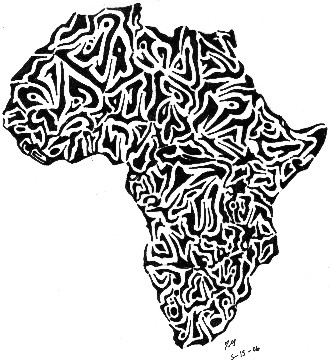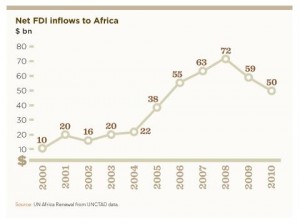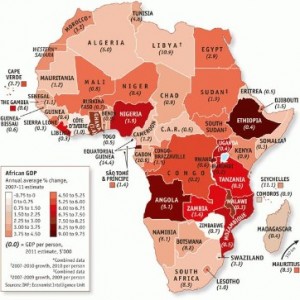
Critical Issues Facing Africa: Foreign Direct Investment
Foreign Direct Investment has increased in recent years across regions, especially by larger, more quickly developing nations like China.[i] At 2012 year-end, the Congressional Research Service reported $61.4 billion in US to Africa direct investment.[ii] However, a rise in investment does not necessarily correlate with genuine economic growth, rise in employment, or financial resources within the country to meet basic needs and innovate.
 Corrupt government officials commonly pocket a significant percent of these investment funds, and foreign firms often bring their own workforce effectively capturing the potential economic growth for their own.[iii] While there are benefits for national and regional economies, they are not as direct or positive as possible. This is also due to a lack of knowledge on the interests, wants, and needs of shareholders and individual economies at large.
Corrupt government officials commonly pocket a significant percent of these investment funds, and foreign firms often bring their own workforce effectively capturing the potential economic growth for their own.[iii] While there are benefits for national and regional economies, they are not as direct or positive as possible. This is also due to a lack of knowledge on the interests, wants, and needs of shareholders and individual economies at large.
Regardless of the mechanisms of development and the unique factors within each country and regional economies, no initiative will be truly successful without recognizing and adapting to the impacts of climate change. Heavy dependence on petroleum exports is not a sustainable economic foundation for countries like Nigeria.
Additionally, providing access to the market for small farmers will not ensure their economic future if their crops are destroyed by drought or flood. Infrastructure investment will be useless if it is soon covered by a rise in sea level or degraded by increasingly damaging super-storms.
The economies of African nations must be understood as individual entities and within larger regional and continental contexts. The African Union and RECs (Regional Economic Communities) enable nation-states enable stronger intra-continental economic cooperation while also providing a formalized mechanism for incorporating more comprehensive perspectives into discussions with the IMF, World Bank, UN and providers of foreign public and private direct investment.
While African economies are growing as a whole and the size of the middle class is increasing, “growth” and “middle class” are not universally synonymous terms. As discussed in a recent NYT article “Africans Open Fuller Wallets to the Future” 7/20/2014, a 2011 report by the African Development Bank estimated the size of the African middle class to be approximately 250 million people, up from 126 million in 1980. The OECD estimates the number at 32 million, or about the same size as Canada’s middle class. [iv]
 This vast difference in estimation is due to conflicting definitions of the middle class. The African Development Bank defines middle class as an individual earning $2 USD per day or more. According to the Millennium Development Goals, extreme poverty is an income of $1.25 USD or less, while other organizations like the World Bank also measure poverty at an income of $2 USD per day.[v] [vi]
This vast difference in estimation is due to conflicting definitions of the middle class. The African Development Bank defines middle class as an individual earning $2 USD per day or more. According to the Millennium Development Goals, extreme poverty is an income of $1.25 USD or less, while other organizations like the World Bank also measure poverty at an income of $2 USD per day.[v] [vi]
Regardless of choice in metric, it is clear the number of individuals with an income high enough to save even a small amount or purchase small quantities of necessities is increasing. This rise in the lower-middle and middle class is a fundamental shift away from almost complete abject poverty with the exception of a few extremely wealthy elites in many nations like Angola, Botswana, and Kenya.[vii]
While the dramatic increase in consumption in the last two decades in much of Africa is seen as signs of successful development, unequal access to basic needs is still a major concern. Coupled with the impacts of climate change, inadequate governance systems, and consistently high rates of corruption, the already key role of internationally support non-government organizations is growing.
The presence of not for profit organizations is well established throughout Africa, as are resource-based corporations. In Kiberia and Mathare, Kenya, Shining Hope for Communities (SHOFCO) fights gender inequality and urban poverty by providing tuition free education of girls and young women and community services for all to serve its core initiatives of education, water and sanitation, public health and community empowerment. The organization is funded largely by international private donations and grants with a strong emphasis on local, grassroots support and collaboration.[viii]
SHOFCO is also the largest employer in Kiberia and provides opportunities for community members to sell handmade jewelry internationally through organizational chapters on US college campuses. This added element of social enterprise is reflective of what seems to be the new frontier in Africa. Organizations like Joomah, an online job-market place in Sub-Saharan Africa, have the explicit goal of providing goods and services to enable further economic development for a profit.[ix] Botswana, Ghana, and Nigeria have all seen an increase in organizations at the intersection of money and meaning.
[i] “World Investment Report 2013: Global Value Chains- Investment and Trade for Development,” United Nations Conference on Trade and Development, http://unctad.org/en/PublicationsLibrary/wir2013_en.pdf.
[ii] James K. Jackson, “US Direct Investment Abroad: Trends and Current Issues,” Congressional Research Service, December 11, 2013, http://fas.org/sgp/crs/misc/RS21118.pdf.
[iii] Claire Furpy, “Corruption in Africa: A Crime Against Development,” Consultancy Africa Intelligence. November 16, 2010. http://www.consultancyafrica.com/index.php?option=com_content&view=article&id=605:corruption-in-africa-a-crime-against-development&catid=87:african-finance-a-economy&Itemid=294
[iv] Nicholas Kulish, “Africans Open Fuller Wallets to the Future,” The New York Times, July 20, 2014, http://www.nytimes.com/2014/07/21/world/africa/economy-improves-as-middle-class-africans-open-wallets-to-the-future.html?_r=0.
[v] Nicholas Kulish, “Africans Open Fuller Wallets to the Future.”
[vi] “Millennium Goals: Eradicate Extreme Poverty and Hunger,” United Nations: Millennium Development Goals,” http://www.un.org/millenniumgoals/.
[vii] Nicholas Kulish, “Africans Open Fuller Wallets to the Future.”
[viii] Shining Hope for Communities, http://www.shofco.org/.
[ix] Joomah, https://www.joomah.com/about-us/.






[…] Critical Issues Facing Africa: Foreign Direct Investment […]
[…] Critical Issues Facing Africa: Foreign Direct Investment […]
[…] Critical Issues Facing Africa: Foreign Direct Investment […]